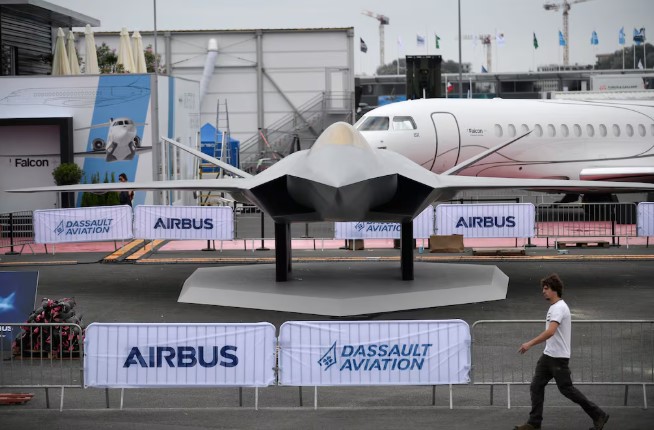A major problem has come up in one of Europe’s biggest defense projects, the Future Combat Air System (FCAS). France, Germany, and Spain started this project to build a new and advanced fighter jet. The plan is to create a next-generation aircraft that can work with drones and have high-tech communication tools.
Serious Problems in Europe’s Jet Project
But now, this large plan is in danger. The two main companies leading the effort, Airbus and Dassault, are not agreeing with each other. Airbus represents Germany in the project, and Dassault represents France. They are supposed to work together on building the first demo version of the fighter jet. But their arguments are slowing everything down.
Airbus and Dassault are not agreeing on who should do what work. They also disagree on how decisions should be made. There is conflict over who should lead certain parts of the project. These disagreements are stopping progress.
If they don’t solve the issues soon, the project could fail. The project started in 2017 with big hopes. It aimed to make Europe stronger in defence. It was also meant to bring European countries closer together. Now, those plans are under serious threat.
Conflict Over Roles and Decisions
One of the main reasons for the argument is how Airbus and Dassault are dividing the work. In the original agreement, France, Germany, and Spain agreed to give each country an equal say in decision-making. That meant one country, one vote. But now, people are questioning this system.
Dassault Rafale’s Bold Performance Sends Shockwaves Through F-35 and Gripen Markets
Dassault believes that it is leading the fighter jet part of the project and therefore should be allowed to do more. It wants a bigger share of the work than just one-third, which is what it currently has. This has caused tension with Airbus, which is also playing a key role in the project.
Dassault also argued that the current system of equal voting is unfair. It believes that, even though France leads the project and contributes significant money and support, Germany and Spain can still outvote France. This is making it hard for the project to move forward smoothly.
There are also disagreements between Airbus and Dassault about which company should lead important parts of the fighter jet. Both sides have strong opinions and long histories of building military aircraft. Because of this, neither side wants to give up control. Each one believes it knows best, and this is stopping the project from moving ahead.
Growing Pressure as Time Runs Out
This delay is happening at a time when many European countries are trying to improve their own defense systems. Geopolitical tensions in different parts of the world are making countries think more about how to protect themselves. The FCAS project was seen as a way for Europe to become more independent in its military strength.
But now, the lack of agreement between Airbus and Dassault is slowing everything down. Airbus has said that the situation is getting very difficult. It believes that the original agreement should still be followed, and that changing it now will only make things worse.
Rafale Under Fire—Not by Missiles, But by China-Pakistan’s Deadly Online Propaganda Machine
Airbus has also pointed out that it has a history of working well with other countries on jet projects. For example, it had strong partnerships in the past with companies from the UK and Italy for other aircraft like the Eurofighter and the Tornado. But it chose to join Dassault for this new project to support a shared European goal. Now, that decision is being tested.
Meanwhile, Britain, Japan, and Italy are working on another fighter jet project. They call it the Global Combat Air Programme, and they plan to build a new fighter jet by 2035. This puts even more pressure on the European project to succeed.
The leaders of the European FCAS project say that Airbus and Dassault cannot solve the problems on their own. They believe that political leaders from the involved countries will have to step in and make a final decision. Unless this happens soon, the whole project could come to a stop.
Everyone involved knows that time is running out. They are aiming to fix the problems by the end of this year. If they don’t, the dream of building a powerful new European fighter jet may not come true.

